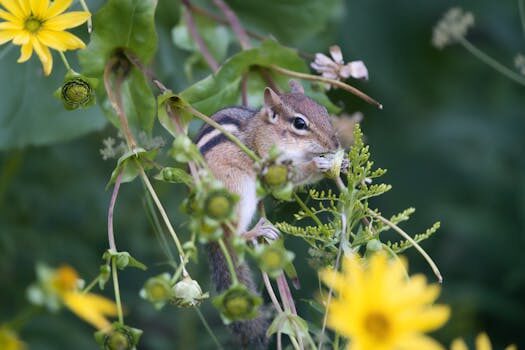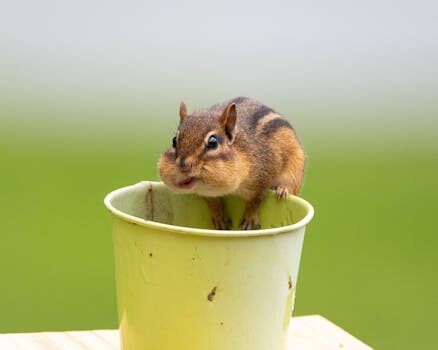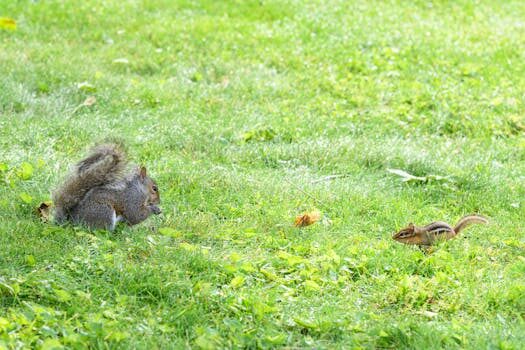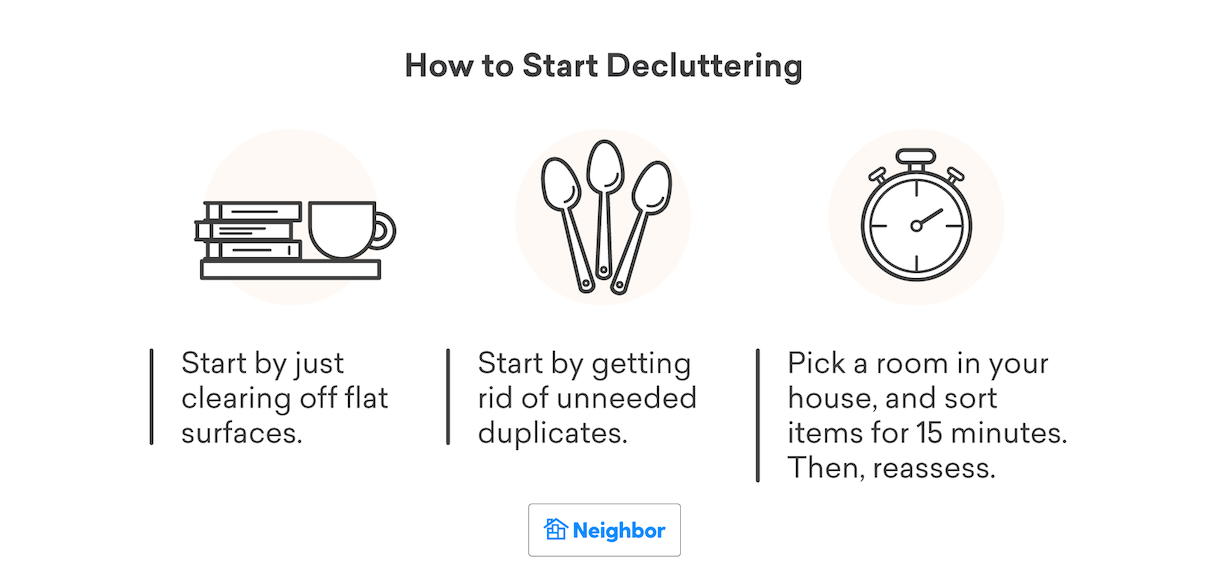Chipmunks, with their cheery chatter and striped backs, might be delightful to watch, but they can become quite the nuisance in your garden. These small, burrowing creatures can cause extensive damage to plants, bulbs, and structures. Finding ways to coexist with wildlife while maintaining the integrity of your garden is key. In this article, we’ll explore how to get rid of chipmunks in the garden using humane methods that deter these critters without causing them harm.
It’s important to address chipmunk issues without resorting to lethal means. With a focus on ecological balance and humane practices, you’ll find that it’s possible to protect your garden while respecting the wildlife that shares your outdoor space. Here are five effective strategies to deter chipmunks.
How can you keep chipmunks out of your garden naturally?
If you’re looking for natural ways to keep chipmunks away, consider these tips. Firstly, reduce the attractants; make sure food sources, like bird seeds or fallen fruits, are cleaned up regularly. Utilizing natural repellents such as garlic or peppermint oil can also deter these small mammals.
Natural predators can be allies in your garden. Encouraging the presence of chipmunk predators, like owls, by installing nesting boxes can help control the population. Another technique is to plant daffodils and alliums, as these are not favored by chipmunks and can act as a natural barrier.
Moreover, a tidy garden is less appealing to chipmunks. They prefer cluttered areas where they can hide and burrow easily. Keep your garden well-trimmed and remove piles of debris where chipmunks may find shelter.
Surprisingly, vibration and noise can be effective deterrents. Consider installing a wind chime or other noise-making ornaments that can startle and keep chipmunks at bay.
What are the best methods to deter chipmunks from your yard?
Effective chipmunk repellent techniques often involve a combination of strategies. Physical barriers, such as hardware cloth or mesh installed around plants and structures, can prevent chipmunks from gaining access to these areas.
Ultrasonic repellents emit sounds that are disturbing to chipmunks but are inaudible to humans, providing a humane method to keep them away. Additionally, homemade chipmunk repellent recipes often include ingredients like cayenne pepper, vinegar, and water – which can be sprayed around the garden to create a no-go zone for these creatures.
It’s also worth considering motion-activated deterrents. Devices that spray water or emit a burst of air when triggered can frighten chipmunks without causing them harm.
Creating a less inviting environment by reducing hiding spots and potential nesting areas can also make your yard less attractive to chipmunks. Fill in or collapse burrows and holes, and consider using gravel or crushed stone as mulch, which is less appealing for digging.

- Install hardware cloth around beds and bulbs.
- Use ultrasonic repellents in key areas.
- Prepare and apply natural repellent sprays.
- Implement motion-activated sprinklers or air-blast deterrents.
- Reduce hiding spots and fill in burrows.
How do you identify signs of chipmunks in your garden?
Detecting the presence of chipmunks starts with spotting the signs. Look for small, round burrow entrances, typically about two inches in diameter. Chipmunks make extensive tunnel systems that can disturb the roots of plants, so unexpected plant damage or collapses might indicate their burrows beneath.
Another sign is the collection of food. Chipmunks stockpile nuts and seeds, so if you notice small hoards near trees or in secluded areas, it could be their work. Additionally, observe for small footprints and tail drag marks in the soil or snow.
 How to get rid of foxes: simple ways to keep them out of your yard
How to get rid of foxes: simple ways to keep them out of your yardChewed plant bulbs or gnaw marks on fruits and vegetables can also be a tell-tale sign of chipmunk activity. They have a varied diet and may nibble on various plants.
Finally, listen for their characteristic high-pitched chirping sounds. Chipmunks are vocal creatures, and their chatter can often be heard if they are nearby.
What attracts chipmunks to your garden and how to prevent it?
Understanding what attracts chipmunks to your garden is crucial in preventing an infestation. Food sources are the main attraction; bird feeders, pet food dishes, and unattended fruits or nuts can draw them in. To secure food sources from chipmunks, keep bird feeders elevated and sweep up any spillage, and store pet food indoors.
Shelter is another attraction. Chipmunks seek out places to burrow and hide from predators. Large stones, woodpiles, and dense shrubs can provide the perfect cover. Keep woodpiles neatly stacked and away from the house, and trim back shrubbery regularly.
Water sources, including bird baths or dripping faucets, can also attract these critters. Make sure to fix leaks and consider removing standing water if chipmunks are a persistent problem.
Interestingly, some plants can be more attractive to chipmunks than others. While they tend to avoid daffodils and alliums, they are drawn to berries, bulbs, and seeds. Planting less appealing vegetation can help deter them from your garden.
How can you get rid of chipmunks under your deck?
Chipmunks can take refuge under decks and porches, creating a nuisance. To evict them humanely, start by removing any food sources that might be luring them there. Then, implement exclusion techniques such as sealing off access points with hardware cloth or metal flashing.
Encouraging them to leave on their own is also an option. This can be done by disturbing the quiet environment they prefer. Play a radio at low volume throughout the day, or use motion-activated lights to create an unsettling habitat for the chipmunks.

Live traps can be a humane solution if used correctly. Bait traps with peanut butter or seeds and check them frequently to ensure any captured chipmunks can be released promptly and safely into a suitable wild area far from residential spaces.
After ensuring all chipmunks have left, it’s important to prevent future infestations. Fill in any holes or burrows with gravel and cover the ground under the deck with a layer of hardware cloth, anchored securely to prevent digging.
- Remove food sources near the deck.
- Seal off access with hardware cloth.
- Disturb their habitat with light and sound.
- Use live traps and release chipmunks humanely.
- Prevent future infestations by securing the perimeter.
When should you call a professional for chipmunk control?
Sometimes, despite our best efforts, chipmunk problems persist. If you’ve tried multiple methods without success, it might be time to call a professional for chipmunk control. Professionals can offer more advanced solutions, such as targeted trapping and removal, and can also assess your property for vulnerabilities that might be attracting chipmunks.
It’s important to choose a wildlife control professional who practices humane removal and has experience with chipmunks specifically. They can also provide guidance on long-term prevention strategies to keep your garden chipmunk-free.
 How to get rid of ants: repel these insects from your home and garden with these tips
How to get rid of ants: repel these insects from your home and garden with these tipsIf you notice signs of structural damage or extensive burrowing that might compromise your home’s foundation, this is a clear sign that professional help is needed. Similarly, if you’re concerned about potential health risks associated with chipmunks, such as ticks or rabies, seek expert advice.
FAQs
What is the best deterrent for chipmunks in the garden?
The best deterrent combines habitat modification, food source management, and the use of repellents. Eliminating hiding spots, securing food sources, and using natural or ultrasonic repellents can effectively keep chipmunks away from your garden without harming them.
Physical barriers and habitat disruption are also key. Making your garden less inviting by removing clutter and potential nesting areas can go a long way in deterring chipmunks.
How to humanely deter chipmunks?
To deter chipmunks humanely, focus on methods that don’t cause harm. Live trapping and relocation, habitat alteration, and natural repellents are all effective and ethical ways to manage chipmunk populations in your garden.
Respect for wildlife is paramount. Ensure that any strategies you use do not harm chipmunks or other animals and are focused on coexistence rather than eradication.
What smells do chipmunks hate the most?
Chipmunks have a strong aversion to certain smells, including garlic, peppermint, and eucalyptus. Utilizing these scents in your garden can act as a natural deterrent. Spraying a mixture of water and a few drops of peppermint oil around your garden can be an easy and humane way to keep chipmunks at bay.

Other smells they dislike are cider vinegar and the scent of predator urine. These can be found in commercial repellents or can be home-brewed for a DIY solution.
Do coffee grounds repel chipmunks?
Yes, coffee grounds can be an effective repellent for chipmunks. The strong smell is off-putting to them, and sprinkling used coffee grounds around plants and entry points can help deter these critters. Plus, coffee grounds can enrich the soil with nitrogen, making it a beneficial addition to your garden.
Coffee grounds work best when combined with other methods, such as habitat modification and food source management, for a comprehensive approach to chipmunk control.
For those who prefer a visual guide on humane methods to manage chipmunks, here’s a helpful video from YouTube:
In conclusion, by understanding chipmunk behavior and utilizing humane and natural methods, you can effectively keep chipmunks out of your garden. Remember, the key is to create an environment that is less attractive to them while respecting and protecting wildlife. With patience and consistency, you can enjoy a chipmunk-free garden that thrives.
 Should you use BBQ ash in garden soil? We separate fact from myth
Should you use BBQ ash in garden soil? We separate fact from myth

Thanks for sharing these humane strategies for keeping chipmunks at bay! It’s great to see options that focus on coexistence and respect for wildlife while still protecting our gardens. I’ve been struggling with these little guys around my plants, so I’m definitely going to try out some of these tips, like using natural repellents and keeping the area tidy. Looking forward to seeing how it goes!